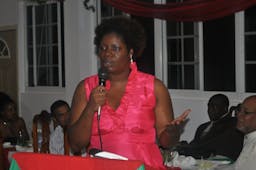How My Voice Went Underground
Jun 15, 2020
Story
Growing up in my small community in Kilmarnock, St. Elizabeth it was routinely accepted that success would come at a price. We all believed that getting to your dreams meant 'jumping through hoops', ''scaling fences' and 'climbing mountains' it therefore meant that it was easy for us to accept discrimination and injustice. The danger of this mentality is that it accepts somehow that as a woman the struggles I experienced on a daily basis were well within reason, in fact now that I look back I realize how utterly unfair some of those difficulties and challenges were.
As a matter of fact until this particular assignment I would not have thought the 'difficulties' I experienced could have been explained as 'barriers' to my progress as a girl. I think my first reflection and acknowledgement of this would be looking back to me in seventh grade, just about the point I started having my period and how utterly painful it was, every month I was forced to battle through painful menstruation, I routinely had to be hospitalized, after awhile my mother just stopped me from school when I was having my period. I missed so much, I lived a half and half life, I stopped playing sports, even though I was a very good netball player. Doctors treated my condition with very little urgency nor did they offer any kind of suggestion as to how I could navigate my monthly crisis. I suffered in silence, with no one to talk to about how my life was shrinking around me.
Going to school presented me with another challenge; girls were repeatedly preyed on by bus drivers and conductors. Sexual overtures and innuendos were common; a girl had to be strong and aggressive as we attempted to navigate travel to and from secondary school. As I reflect, I think of my friends who at a very young age got involved with older men who knew exactly what to say to get these naive, defenceless girls to agree to become involved with them. Pretty soon I had no friends, and those innocent conversations we would have as we sipped box juice on our way to and from school were no more. I felt lonely, there was no one to engage us in discussions about our rights as young women, no one to explain these new feelings we were experiencing, no one to have candid conversations with. I noticed how quick older women were to judge, they became very hostile and were the first to jump to conclusions about why we were talking to a boy or why our skirt looked short or slightly tight. We lived in a culture which did not trust a girl upon her entry to puberty, somehow my body did not only betray me, it had betrayed all the people who liked me and thought I was cute and well-mannered up until my breasts started to grow.
It was not easy, as girls we were also fighting institutional and structural biases. Jamaica's secondary school system is stratified and reinforces class, colour and other barriers. When I sat the Common Entrance Exams at twelve years old, I did not pass the exams. Students, who pass, are given a space in one of Jamaica's Prestigious Colonial Schools. For me at twelve, this taught me that I was 'dunce', making my way to the Black River Secondary School every day was almost like taking a walk of shame, the experience undermined my confidence and self-esteem severely. It was a challenge to make it to school on a daily basis, every time I donned the uniform I knew I was second class, I knew I was not bright enough, I knew I did not make the cut.
Now that I think back, and now that I have been asked to reflect I recognize that these series of events changed me, changed my life, changed my perceptions. How much more safe I would have felt, If I had help and insight to navigate the troubled waters of puberty. I had to do it with very little feedback, with little or no information and in a context that was hostile and distrustful. I realize now that it is for this reason that I started the "I'm Glad I'm A Girl Foundation" I want girls to know that they have rights, that they are beautiful and good at every stage of life, that their body is beautiful and that puberty will bring with it exciting new feelings. That it will bring all kinds of attention, some unwanted but that they will be empowered enough to make informed decisions. I want them to know that they are worthy of trust. I want mothers to know that they have it within them to help their daughter become happy women.




